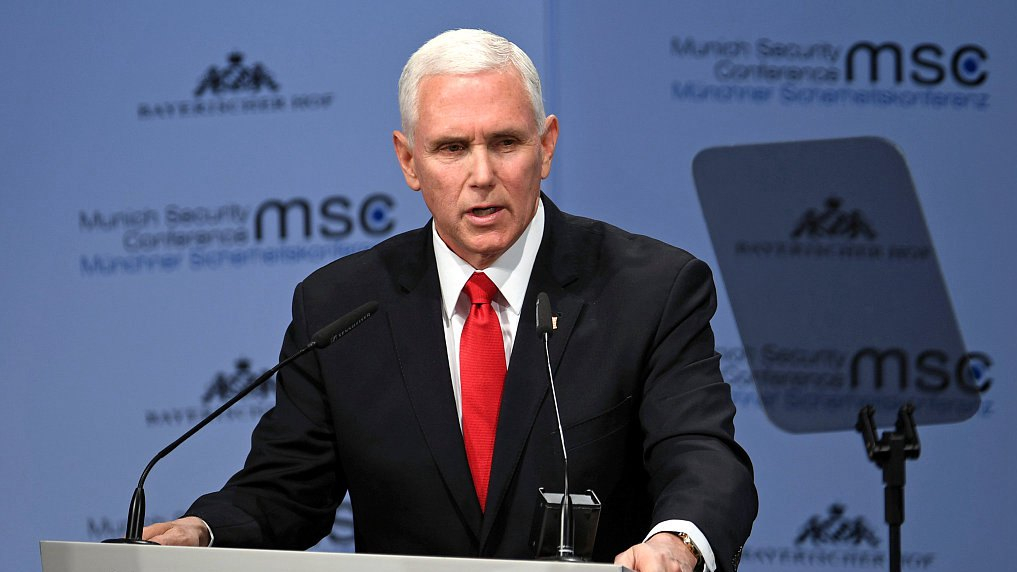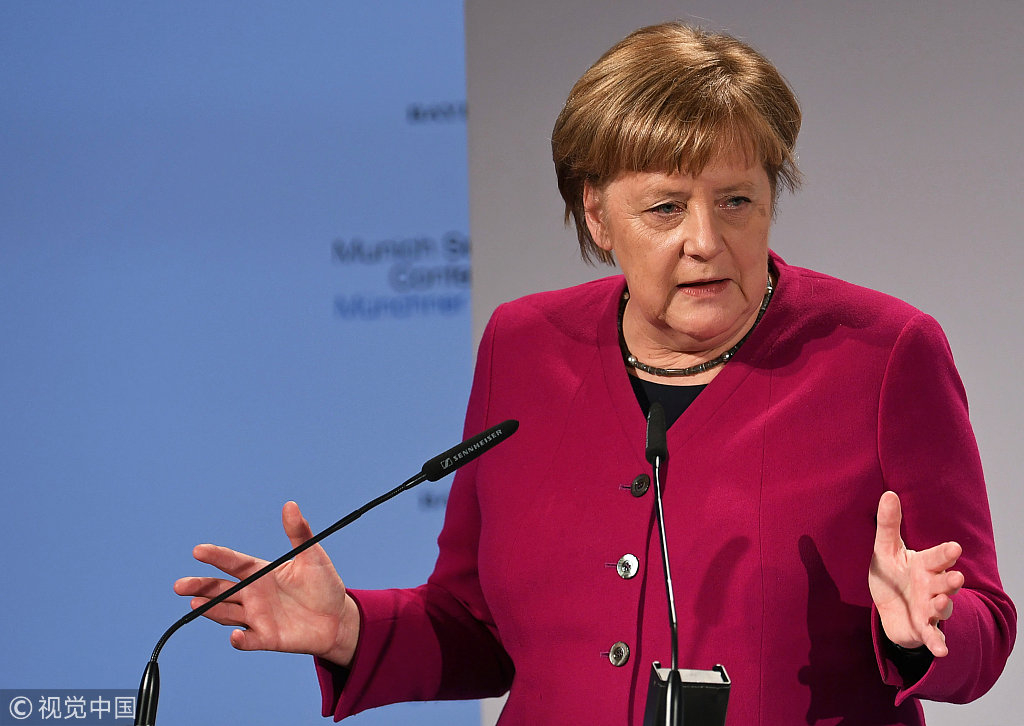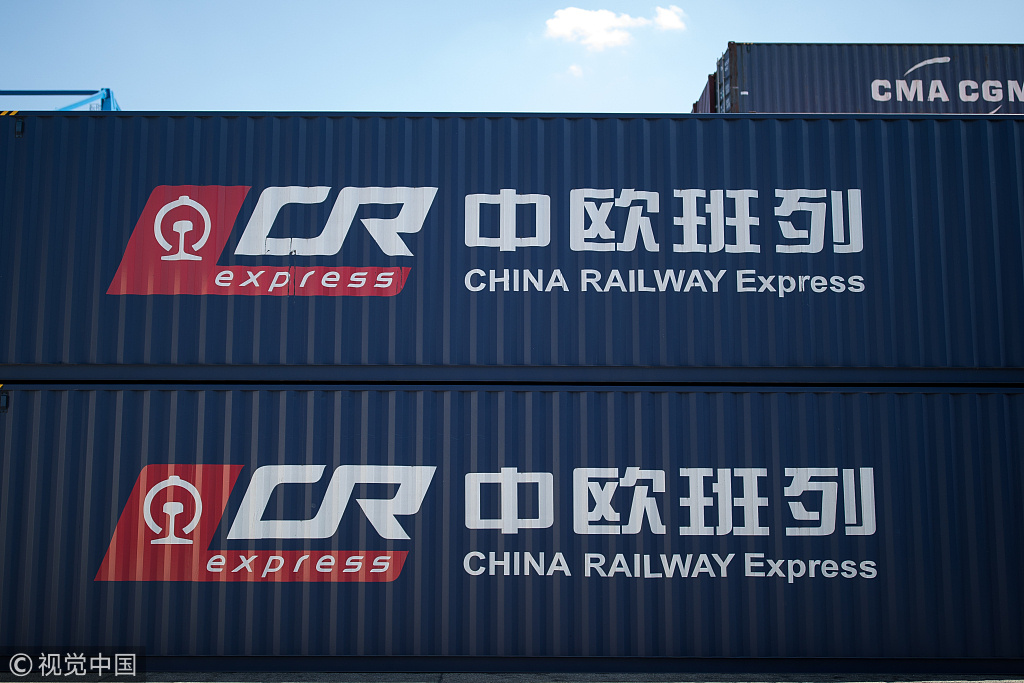
Opinion
22:42, 18-Feb-2019
Trump's 'America First' fuels EU-U.S. rifts at MSC
Updated
22:57, 18-Feb-2019
Liu Jianxi

Editor's Note: Liu Jianxi is an opinion editor at CGTN Digital. The article reflects the author's opinion, and not necessarily the views of CGTN.
Schisms between the United States and Europe were on vivid display at the just-concluded Munich Security Conference last week. While German Chancellor Angela Merkel won a standing ovation for her stinging criticisms against Washington's foreign policy, things took an icy turn when U.S. Vice President Mike Pence proclaimed Donald Trump “the leader of the free world.”
Merkel appeared particularly aggrieved by U.S. accusations against German auto exports. “We are proud of our cars… If that is viewed as a security to the United States, then we are shocked,” Merkel said at the conference, lamenting that the U.S.-led global order “has collapsed into many tiny parts.”
The annual security conference, a traditional occasion to strengthen Western united fronts, underscores the expanding gaps between Europe and the United States this year. Reuters is blatant about the EU-U.S. rifts: “His [Pence's] four-day trip to Europe succeeded only in deepening divisions with traditional allies.”

German Chancellor Angela Merkel speaks during the Munich Security Conference in Munich, Germany, February 16, 2019. /VCG Photo
German Chancellor Angela Merkel speaks during the Munich Security Conference in Munich, Germany, February 16, 2019. /VCG Photo
The EU-U.S. alliance is falling apart on a wide variety of issues. While the United States has been pressuring NATO allies to double the existing defense spending of 2 percent, which many do not meet, European countries bear a grudge against Trump's unilateral tariff war and his capricious withdrawal from a slew of international pacts including the Paris climate accord and the Iran nuclear deal.
The development of EU-U.S. ties has been in a downward spiral especially during Trump's term in office. “With friends like that [Trump], who needs enemies?” European Union chairman Donald Tusk once asked.
The strife in EU-U.S. relations is not surprising in the multipolar world. The Western camp was originally formed during the Cold War era to counter socialist countries. For decades, the EU has been relying on the U.S. for security and the assistance of the Marshall plan for economic prosperity. In return, it has been in the vanguard of the U.S.'s global dominance. Simply put, common interests in security, economy and geopolitics are the foundation for the EU.-U.S. alliance.
But in the multipolar world, the EU can sometimes reap even more benefits from collaborating with emerging economies than with its traditional ally. For example, China's huge market makes it a more popular export destination than the United States.
Europe's closer ties with emerging economies, especially those with a socialist system, are something Trump is unwilling to see. The United States has for several times warned the EU about the “strategic risks” of cooperating with China-represented economies, but these warnings ended in vain. Compared with Washington's hegemony pursuit, European countries apparently attach more importance to their own economic wellbeing.

Containers from China are seen in Duisburg Port (DIT Duisburg Intermodal Terminal) in Duisburg, Germany, July 16, 2018. /VCG Photo
Containers from China are seen in Duisburg Port (DIT Duisburg Intermodal Terminal) in Duisburg, Germany, July 16, 2018. /VCG Photo
The foundation for the EU-U.S. alliance has thus been shaken, with Trump's “America First” doctrine another heavy blow. Trump's demand for more defense spending by NATO allies and withdrawal from international treaties mean the United States under Trump is no longer willing to take the security responsibility for the EU. This has directly sparked anger among European countries, which eventually led to EU-U.S. rifts on this year's security conference.
Instead of dancing to the U.S.'s tune, Europe has become much more independent in its geopolitical decisions, of which its attitude toward Huawei is a typical example. Despite Washington's fervent campaign to kill this Chinese telecommunications giant, few European countries have banned the firm from their telecommunications infrastructure.
The United Kingdom, highly dependent on Washington for diplomatic support and also a member of “five eyes” intelligence group, takes a contrary position from the United States. Its review on Huawei concludes that there was no need to ban the firm from its market. Hungary and Slovakia publicly dismissed criticisms against Huawei during U.S. Secretary of State Mike Pompeo's Central European tour.
The world superpower seems to have become increasingly isolated in the global arena. It is high time that the Trump administration should wake up from its “America First” illusion and embrace multilateralism. After all, cooperation, rather than protectionism, is the key to realizing the American Dream.
(If you want to contribute and have specific expertise, please contact us at opinions@cgtn.com.)

SITEMAP
Copyright © 2018 CGTN. Beijing ICP prepared NO.16065310-3
Copyright © 2018 CGTN. Beijing ICP prepared NO.16065310-3